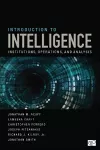
Introduction to Intelligence
6 authors - Paperback
£114.00
Jonathan M. Acuff is an associate professor of intelligence and national security studies at Coastal Carolina University. A former officer in the US Army Reserve, Professor Acuff has also worked as a military analyst for the National Bureau of Asian Research (NBR). While at NBR, he conducted research funded by the Department of Homeland Security evaluating the vulnerability of private sector facilities in the Pacific Northwest to terrorist attacks, as well as several projects supported by US Pacific Command (PACOM). He has published articles in Intelligence and National Security, International Political Sociology, and Totalitarian Movements and Political Religions. He is also the author of numerous book chapters and is the editor (with Brent J. Steele) of Theory and Application of the “Generation” in International Relations and Politics (Palgrave, 2012). Acuff has served four terms on the Executive Committee of the Ethnicity, Nationalism, and Migration (ENMISA) section of the International Studies Association. Professor Acuff previously taught at the University of Washington, Saint Anselm College, and Seattle University and was a Ford Foundation Fellow at the University of Iowa. He teaches courses on intelligence analysis, strategy, international security, terrorism, and writing in intelligence. LaMesha L. Craft’s background includes 20 years of active military service in the US Army as an all-source intelligence warrant officer. Throughout her career, she provided strategic and operational intelligence analysis of nation-state and nonstate threats to US interests, policy, data, and networks in/around Asia, Europe, the Horn of Africa, the Middle East, and Southwest Asia. She has also worked overseas in Kosovo, Germany, Kuwait, and Iraq. Dr. Craft authored a comprehensive guide to conducting intelligence preparation of the battlefield (IPB) when analyzing threats in cyberspace. It was recognized as a “best practice” by the Center for Army Lessons Learned and played an integral role in developing Appendix D of Army Training Publication 2-01.3, published in March 2019. She currently serves as a faculty member of the Anthony G. Oettinger School of Science and Technology at the National Intelligence University. Dr. Craft’s education includes a PhD in public policy and administration with a concentration in homeland security policy and coordination, Walden University; an MA in international relations and conflict resolution, American Military University; and a BA in international relations and international conflict, American Military University. Christopher J. Ferrero holds a bachelor’s degree in political science from Villanova University, a master’s degree in security studies from Georgetown University, and a PhD in foreign affairs from the University of Virginia. He worked as a weapons of mass destruction analyst for the US Department of State from 2002 to 2003 and for the US Missile Defense Agency from 2003 to 2006. His areas of specialization include intelligence studies, WMD, the Middle East, and international security. He has taught courses on a range of international relations subjects at the University of Virginia, Seton Hall University, Syracuse University, and Coastal Carolina University. Dr. Ferrero is a member of US Strategic Command’s Deterrence and Assurance Academic Alliance and a regular participant in the Arab Nuclear Forum at the University of Jordan in Amman. Joseph Fitsanakis, PhD, is an associate professor in the intelligence and national security studies program at Coastal Carolina University, where he teaches courses on intelligence communications, intelligence operations, intelligence analysis, and human intelligence, among other topics. He has published widely on intelligence collection (communications interception and cyber espionage), intelligence reform, and transnational criminal networks. His writings also cover the evolution and practices of intelligence agencies in the United States, the Balkan region, northeast Africa, and Asia, with particular emphasis on China and North Korea. Before joining Coastal Carolina University in 2015, Dr. Fitsanakis built the security and intelligence studies program at King University, where he also directed the King Institute for Security and Intelligence Studies. He is also deputy director of the European Intelligence Academy and senior editor at intelNews.org, an ACI-indexed scholarly blog that is catalogued through the US Library of Congress. Richard J. Kilroy Jr. is an associate professor in the Department of Politics at Coastal Carolina University in Conway, South Carolina, where he teaches courses in support of the intelligence and national security studies degree program and Latin America regional studies. He is also a former army intelligence and Latin America foreign area officer, having served in Germany, the US embassy, Mexico City, and US Southern Command in Panama. He holds an MA and PhD in foreign affairs from the University of Virginia. Dr. Kilroy is coauthor of Seguridad Regional en América del Norte: Una Relación Impugnada, published by Universidad Iberoamericana Press, Mexico (2020); editor of Threats to Homeland Security: Reassessing the All-Hazards Perspective, published by John Wiley and Sons, first and second editions (2008, 2018); coauthor of North American Regional Security: A Trilateral Framework? published by Lynne Rienner (2012); and coeditor of Colonial Disputes and Territorial Legacies in Africa and Latin America, published by the Northeast Asian Historical Society, South Korea (2010). Jonathan C. Smith is a professor in the intelligence and national security studies program at Coastal Carolina University, which he established in 2011. He also serves as the Educational Practices Committee chairman for the International Association for Intelligence Education. In addition to his teaching activities, Dr. Smith served in the US Navy Reserve as an intelligence officer. In a 23-year career, he deployed in support of operations in Bosnia, Kosovo, Iraq, Afghanistan, and the global war on terrorism. His last assignment was as the commanding officer of Joint Intelligence Operations Center 0174 at the US Southern Command in Miami, Florida. Dr. Smith received his master of arts in international studies and his doctorate in political science from the University of South Carolina. He also earned a certificate in the Joint Professional Military Education program of the US Naval War College.